Do VPNs block ads? 8 ad-blocking VPNs
Ads still slowing you down, even with a VPN? That’s because many VPNs don’t include ad blockers. Check out these eight VPNs that do block ads. Then, get Norton VPN for an all-in-one solution that keeps your connection data private while hiding ads.

A virtual private network (VPN) encrypts your internet traffic, hides your IP address, and masks other online identifiers. An ad blocker hides or blocks ads and trackers. Together, they strengthen your privacy by preventing advertisers from following you with targeted ads, helping you browse freely and without interruptions.
Privacy tools like these are becoming mainstream. According to CNET, 43% of US adults use VPNs (often for work), while research from GWI shows that roughly 30% of internet users worldwide use ad blockers. But apps that combine both functionalities aren’t so common.
Read on to learn how VPNs and ad blockers differ and how they work together. Then, explore eight VPNs with ad-blocking functionality.
Can VPNs block ads?
A VPN by itself does not block ads. Instead, it encrypts (or scrambles) your data and routes it via a secure server, hiding your IP address and location. But some VPN apps, like Norton VPN, include ad-blocking capabilities in addition to their core VPN functionality. And by changing your virtual location, a VPN can also affect the types and quantities of ads you see.
For example, Cloudwards found that when using the streaming platform Twitch, VPN servers in Albania, Moldova, and Mongolia showed fewer ads than servers in the U.S. or U.K. Some Reddit users even reported successfully blocking ads from streaming services like Netflix or Peacock by connecting through other countries.
What can VPNs block?
VPNs work by concealing your connection data from outside observers, stopping hackers or your internet service provider (ISP) from tracking your activity, selling your data, showing targeted ads, or throttling your speed. However, a VPN doesn’t prevent the websites you visit from collecting information through trackers, cookies, or other tools on your device.
VPNs also do not inherently block:
- Display or pop-up ads that appear on websites
- Malware and phishing attacks that target your device
- Details about your system and browser configuration, which can be used for fingerprinting
- Account activity when logged into a site or service
- In-video promotions or sponsored ads embedded in online content
Ad blockers vs. VPNs
While VPNs hide your connection data, ad blockers prevent display advertisements from appearing and block third-party cookies that track your browsing history and help marketers serve you targeted ads.
So, VPNs and ad blockers have different jobs, but they can work together to reduce what ISPs, ad networks, and other third parties can see.
Here’s a quick summary of how they compare:
VPNs |
Ad blockers |
|
|---|---|---|
Encrypts traffic |
Yes |
No |
Blocks ads |
No |
Yes |
Limits targeted ads |
Sometimes |
Yes |
Slows your internet |
Sometimes |
No |
The ad blockers that are sometimes bundled with VPNs can work in different ways. One common type is a Domain Name System (DNS)-based ad blocker, which filters out ads from external ad networks before they load. However, it can’t block ads served directly from the website you’re visiting.
Some VPNs also include browser extension–based ad blockers, which offer broader filtering and can block more types of ads — though these are typically available only on desktop devices.
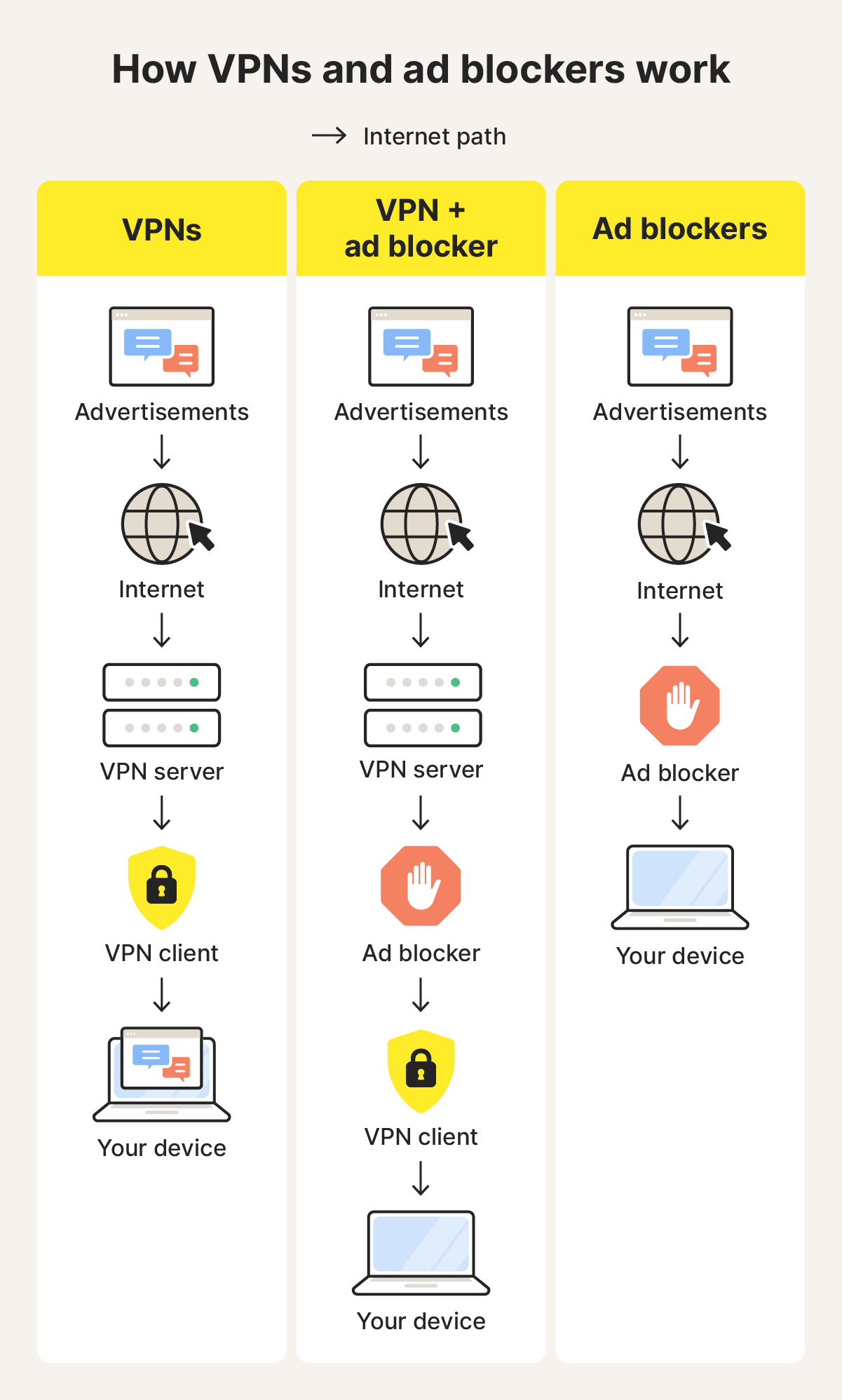

If you’re looking for a cost-effective VPN with built-in ad blocking and no long-term commitment, Norton VPN is a smart choice. With access to servers in over 100 locations worldwide and a strict no-log policy, you can enjoy maximum flexibility and privacy — without a hail of intrusive pop-ups.
Best 8 VPNs with ad blocking
Here are the eight top VPNs with ad-blocking features, in alphabetical order. Our shortlist is based on Trustpilot reviews, Reddit customer experiences, VPN and ad-blocking features, cost, value for money, and our own personal experience using and testing these tools.
1. ExpressVPN
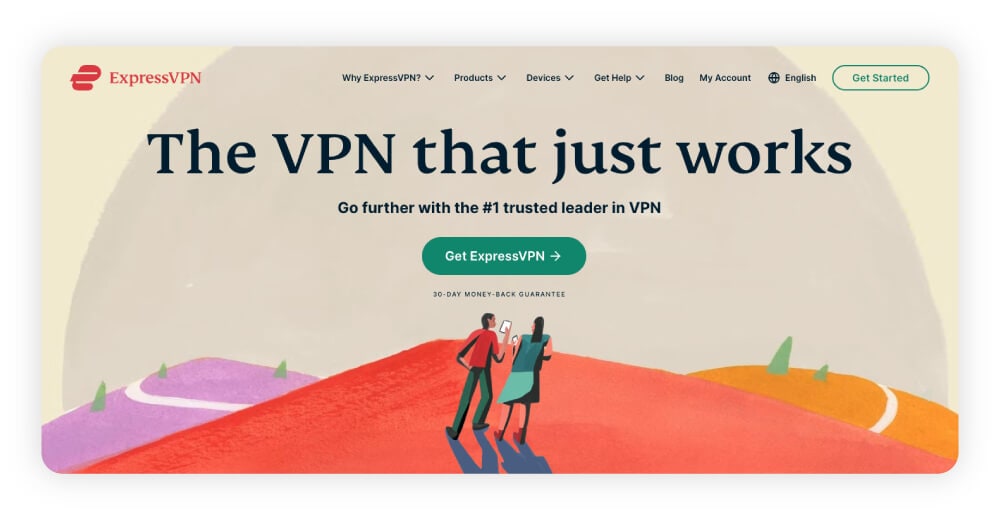

ExpressVPN’s Threat Manager filters out most display ads and blocks trackers. Like many VPNs, it uses DNS filtering to block these ads and sites, so it doesn’t work with video or audio ads. However, the fact that it’s compatible with Android, iOS, Mac, Windows, and Linux devices could be a major draw for some users.
ExpressVPN’s ad blocker also works with its Aircove router without turning on your VPN. This requires you to purchase the company’s router, which you’ll need to set up yourself. Otherwise, you’ll need to turn on the VPN on your device to use the ad blocker.
Trustpilot score |
|
|---|---|
Starting price (yearly) |
$99.95 |
Pros
- Ad blocker is integrated into the VPN, making it easy to enable or disable.
- Works across all major operating systems, including certain routers.
- Ad blocker can also filter adult content.
Cons
- Users report mixed results blocking ads on streaming platforms.
- Independent reviews note inconsistent ad coverage.
- Priced higher than many competing VPN options.
2. IPVanish
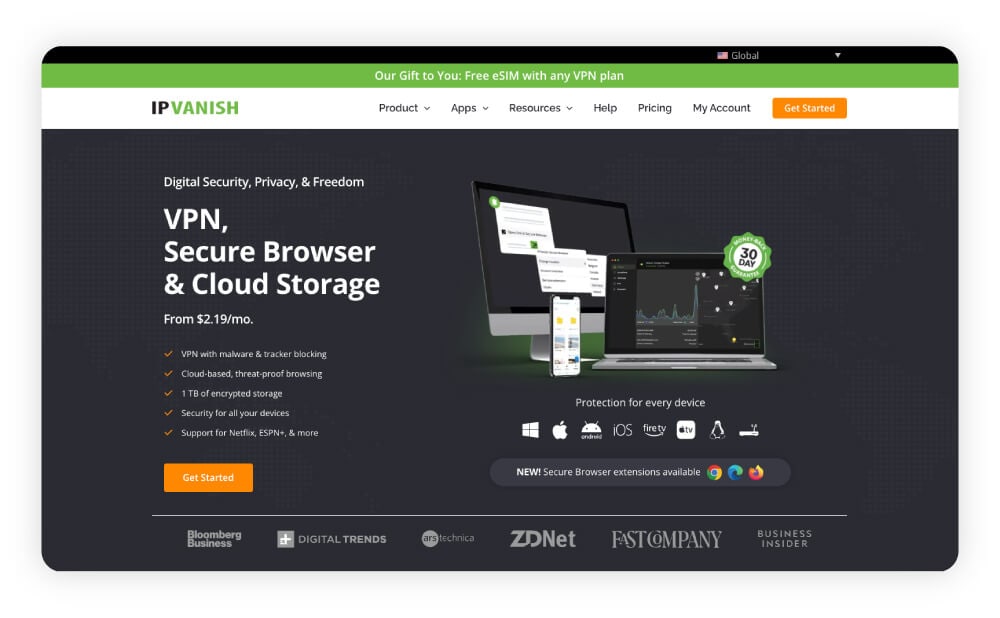

IPVanish uses Threat Protection, a DNS-based filter that blocks trackers and malicious domains across Windows, macOS, iOS, Android, Android TV, and Fire TV devices. However, it’s of limited utility on Android and Fire TV, since DNS filtering doesn’t remove in-stream ads on streaming platforms.
Previously, IPVanish referenced an ad-blocking tool called RedMorph, but today that doesn’t appear as part of the core VPN service — even though its legacy pages remain live. Some user complaints also report unexpected charges or confusion during signup or renewal, so check billing details carefully.
Trustpilot score |
|
|---|---|
Starting price (yearly) |
$52.56 |
Pros
- 30-day money-back guarantee.
- Blocks malicious websites through a DNS-level blacklist.
- Ad blocking works across unlimited devices.
Cons
- Subscription cancellation is reportedly overly complex.
- Users say the ad blocker doesn’t work on Fire TV devices.
- Limited customization options for blocking specific websites.
3. NordVPN
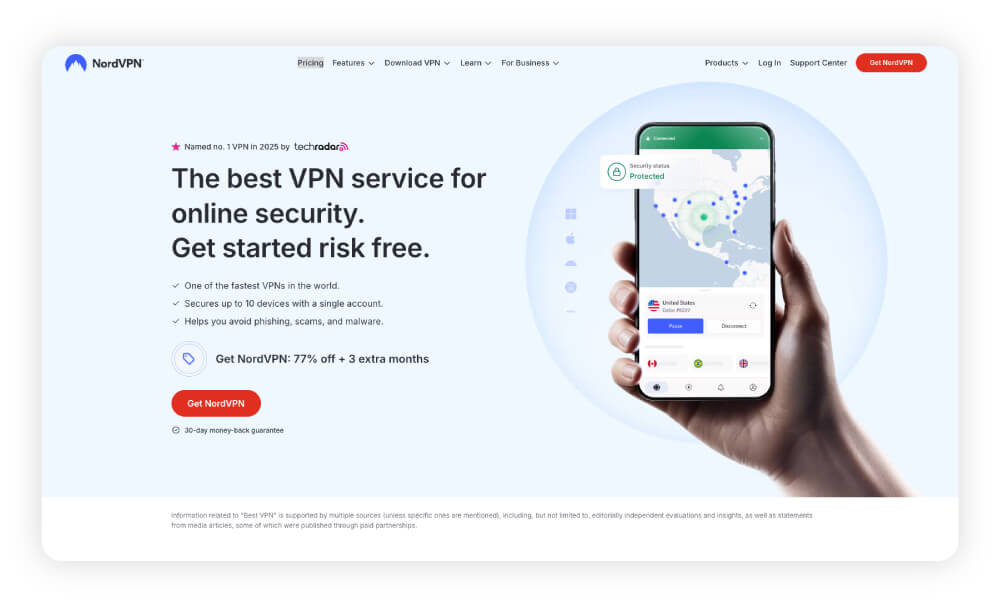

NordVPN’s Threat Protection feature set, available on its Basic Plan, does come with a limited DNS ad blocker, but that won’t work with on-site ads like those on YouTube.
For a fully featured ad and tracker blocker, you’ll need to pay for Nord’s Plus plan to get Threat Protection Pro, which blocks intrusive ads and trackers across browsers and apps, as well as malicious sites, pop-ups, and phishing attempts — good for users who want all-around online protection.
NordVPN enjoys solid user ratings, earning 4.2 out of 5 stars on Trustpilot. However, some customers report being automatically enrolled in renewals at much higher rates than their initial subscription. While price increases at renewal are common across the VPN industry, it’s wise to review the terms carefully and confirm renewal pricing before completing your purchase.
Trustpilot score |
|
|---|---|
Starting price (yearly) |
$59.88 |
Pros
- Blocks multiple ad types, including banners, pop-ups, and some sponsored content.
- Helps webpages load faster and look cleaner.
- Covers up to 10 devices simultaneously.
Cons
- Ad blocker functions only when the VPN is active.
- DNS ad blocker doesn’t block on-site ads.
- Full-featured ad blocker limited to Nord’s desktop version.
Norton VPN includes a built-in Ad Tracking Blocker that works on Windows, Mac, Android, and iOS devices to help prevent advertisers from tracking and targeting you online. That’s in addition to an ad blocker that works on popular desktop browsers and is bundled with all Norton VPN plans, not just premium tiers.
Better yet, Norton recently enhanced its VPN to include over 100 server locations. This gives you greater freedom and flexibility to browse and stream on your own terms, and access content in comfort by taking advantage of Smart TV support.
And while built-in ad blocking is a welcome bonus, it should never come at the cost of core VPN privacy and security. Norton VPN delivers both, offering comprehensive protection alongside advanced performance features, including:
- Split tunneling: Separating your internet traffic into VPN and non-VPN streams using split tunneling lets you establish regular connections to certain apps, without exposing the rest.
- No-log policy: Norton has a strict no-log policy, which means your browsing data isn’t stored, tracked, or shared, helping to ensure your online activity stays private.
- Mimic protocol: A proprietary, lightweight VPN protocol designed to disguise VPN traffic as a regular HTTPS connection and deliver faster, smoother connections.
- IP rotation: By regularly changing your virtual IP address, Norton VPN makes you even harder to track online, helping to reduce targeted ads and avoid dynamic pricing.
- Multi-hop servers: Enabling the Double VPN feature routes your connection through two secure servers at once, adding an extra layer of anonymity.
Trustpilot score |
4.6* |
|---|---|
Starting price (yearly) |
$39.99 |
*Reviews may also reference other Norton products or feature bundles.
Pros
- Ad blocker included in entry-level plan.
- Blocks both ad trackers and ads themselves.
- Built-in kill switch helps prevent privacy exposures.
- Top-performing VPN thanks to DCO boost and other performance upgrades.
Cons
- Renewal pricing costs more than some cheaper VPN options.
5. Private Internet Access
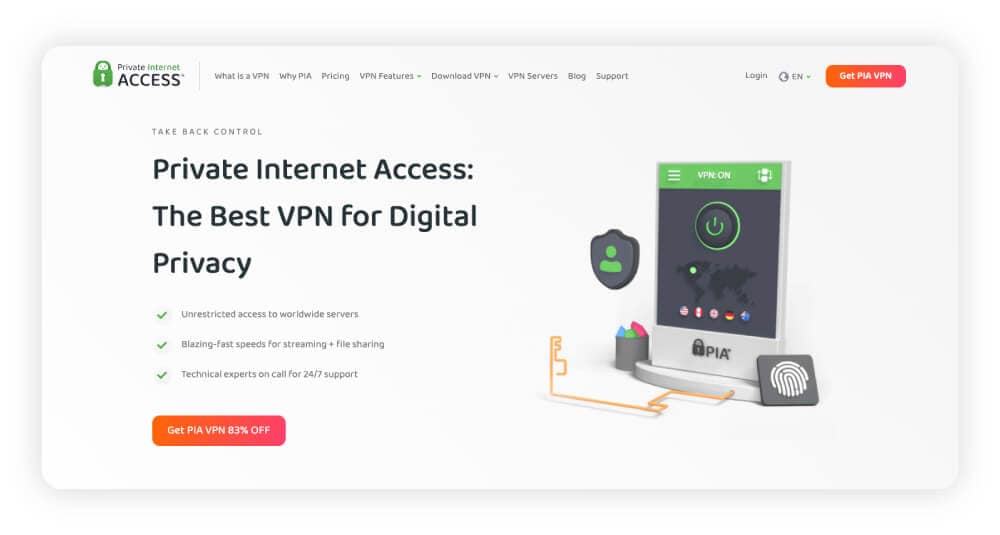

Private Internet Access’s MACE tool is a built-in DNS ad blocker that helps protect your device by preventing access to known malicious domains, trackers, and pop-ups. It works on Windows, macOS, Linux, Android, and browser extensions for Chrome/Firefox.
However, DNS-level blocking can still allow in-video ads, such as those on YouTube, or ads coming from the same domain as the content. And it’s worth bearing in mind that MACE isn’t fully integrated as an app feature on iOS — users must set a custom DNS manually to get similar blocking.
Trustpilot score |
|
|---|---|
Starting price (yearly) |
$39.99 |
Pros
- 30-day money-back guarantee.
- Blocks ads originating from malicious URLs.
- Customizable settings let you whitelist specific websites.
Cons
- Users report ad blocking is ineffective on Android.
- DNS-based blacklist may not catch every ad.
- Some websites reportedly block access for PIA users.
6. ProtonVPN
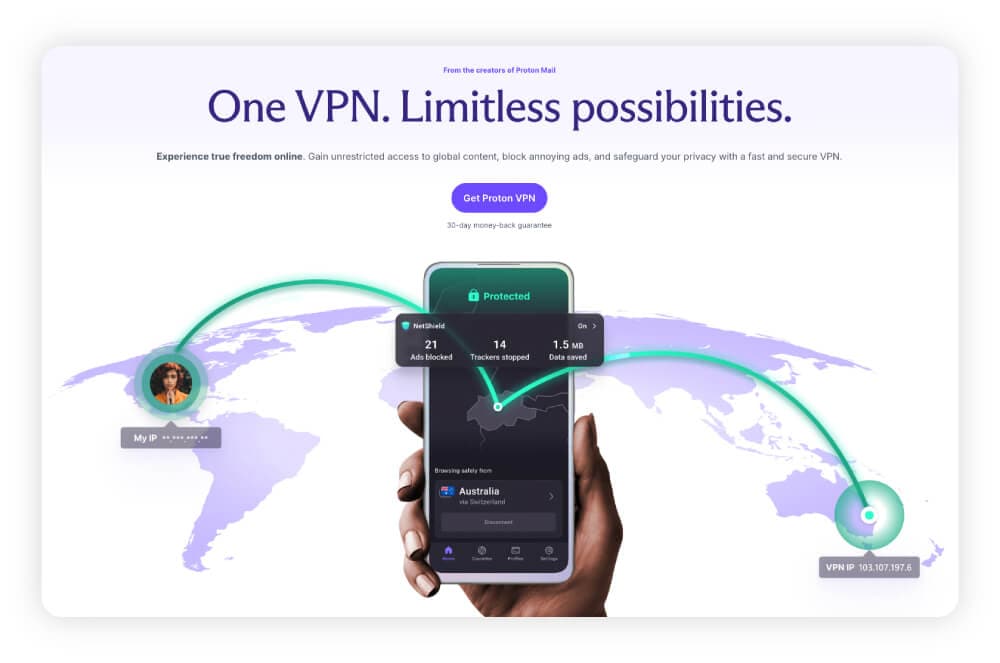

ProtonVPN’s NetShield includes a built-in DNS-based ad blocker that helps block ads, trackers, and malicious websites. It’s available across Windows, macOS, Android, iOS, and Linux, with a NetShield Privacy Panel that lets you choose between blocking only dangerous sites or both ads and trackers.
NetShield is included with all ProtonVPN plans, from the VPN-only option to the Ultimate Plan, which adds features like secure email. However, because it’s bundled with every plan, users looking solely for a VPN ad blocker without extra services may find the lack of customization limiting.
Pros
- NetShield blocks ads, trackers, and certain malware.
- DNS-based filtering blacklists advertising websites.
- Covers up to 10 devices simultaneously.
Cons
- DNS ad blocker cannot stop on-site ads.
- Free plan lacks ad blocking and can run slowly due to crowded servers.
- Doesn’t block static images, GIFs, or YouTube ads, according to All About Cookies.
Trustpilot score |
|
|---|---|
Starting price (yearly) |
$59.88 |
7. Surfshark
SurfShark’s CleanWeb blocks ads, trackers, and pop-ups while browsing the web. Its browser extension works on Chrome, Firefox, and Edge on mobile and desktop devices for all operating systems, including Linux. Users can also install Surfshark on their router.
While CleanWeb comes without needing a premium plan or separate software installation, price increases have led some reviewers to conclude it’s no longer a particularly budget-friendly option. As such, unless you have a huge number of devices that require both VPN and ad blocking coverage, alternative options may be more cost-effective.
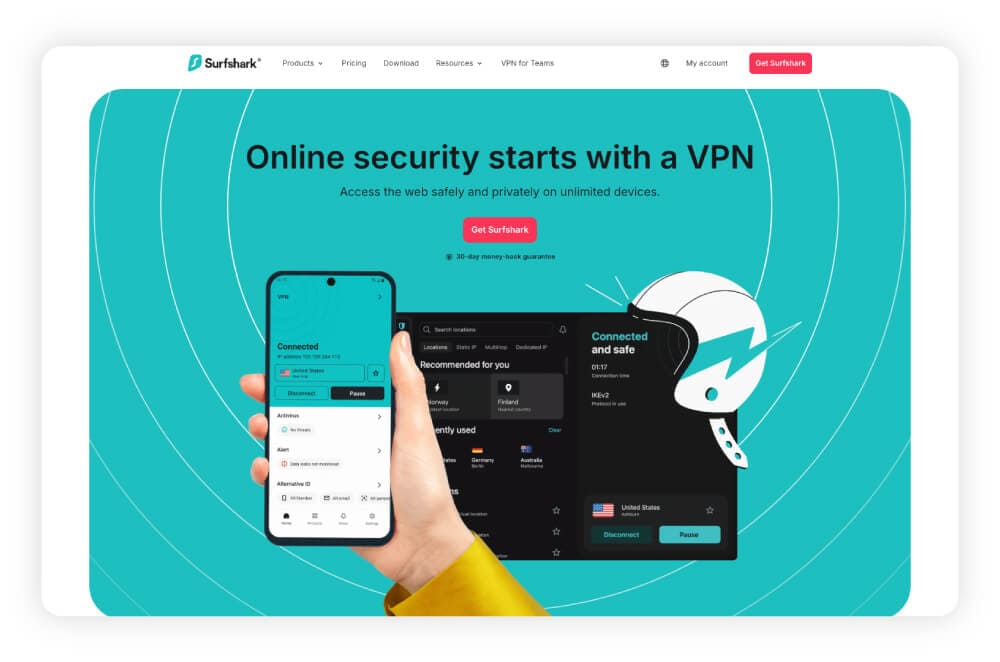

Pros
- Unlimited device coverage.
- Ad blocker can reduce data usage and speed up browsing.
- Works on browser, desktop, and mobile apps.
Cons
- CleanWeb reportedly tends to break websites.
- App versions of the ad blocker are less effective.
- Reddit users say that the app only blocks malicious ads.
Trustpilot score |
|
|---|---|
Starting price (yearly) |
$50.85 |
8. Windscribe
Windscribe’s R.O.B.E.R.T. is a built-in DNS blocker that filters ads, trackers, and malicious domains. You can also toggle category lists and set custom rules to block websites featuring adult content, social media, and crypto sites. This makes it more useful for parental controls, but less useful for ad blocking.
Windscribe’s pricing is unique because you can build a monthly plan for $1 per server (minimum of $3). However, this limits the number of servers you can connect to. Full access costs $69 yearly. Windscribe also offers free plans, but these are limited to 10 GB of data, which can run out quickly if when streaming video.


Pros
- Built-in tool lets you block entire websites.
- DNS-blocking feature allows control over which domains to allow or block.
- Compatible with all major desktop and mobile operating systems.
Cons
- DNS ad-blocking tool can’t be managed from the VPN client.
- Users report occasional bugs in the client.
- Some users describe the R.O.B.E.R.T. feature as confusing or ineffective.
Trustpilot score |
|
|---|---|
Starting price (yearly) |
$69.00 |
Block ads and protect your data
A great VPN should do more than secure your connection — it should make browsing cleaner and faster. Norton VPN blocks intrusive ads and trackers, supports secure protocols, and includes dedicated P2P servers, a kill switch, and over 100 global locations. Protect your privacy and enjoy smoother, faster connections today.
FAQs
How do VPNs with ad blockers stop trackers?
VPNs with ad blockers block tracking scripts embedded in online ads. At the same time, by encrypting your internet traffic and routing it via a secure server, a VPN conceals your IP address, making it more difficult for advertisers and data brokers to link your activity across sites.
Do ad-blocking VPNs block malware?
Ad-blocking VPNs can help protect you from malicious sites by warning or blocking access to unsafe domains before they load. However, to reliably stop malware from downloads, email attachments, or infected files, you’ll need a VPN like Norton VPN with subscription tiers that include antivirus protection.
Should you rely on a VPN ad blocker or get a dedicated ad blocker?
A VPN with built-in ad blocking offers broader privacy benefits because it hides your connection data in addition to blocking ads and trackers. Dedicated ad blockers can complement your setup, but there’s no clear evidence that they’re more effective overall — especially if your VPN already includes ad-blocking and threat protection features.
Editorial note: Our articles provide educational information for you. Our offerings may not cover or protect against every type of crime, fraud, or threat we write about. Our goal is to increase awareness about Cyber Safety. Please review complete Terms during enrollment or setup. Remember that no one can prevent all identity theft or cybercrime, and that LifeLock does not monitor all transactions at all businesses. The Norton and LifeLock brands are part of Gen Digital Inc.


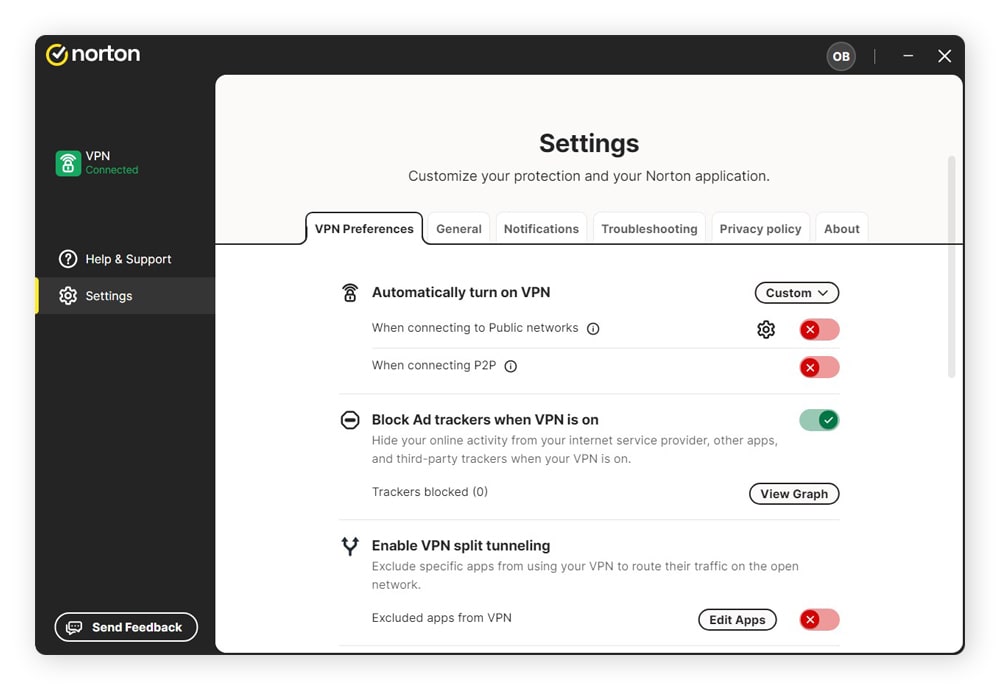
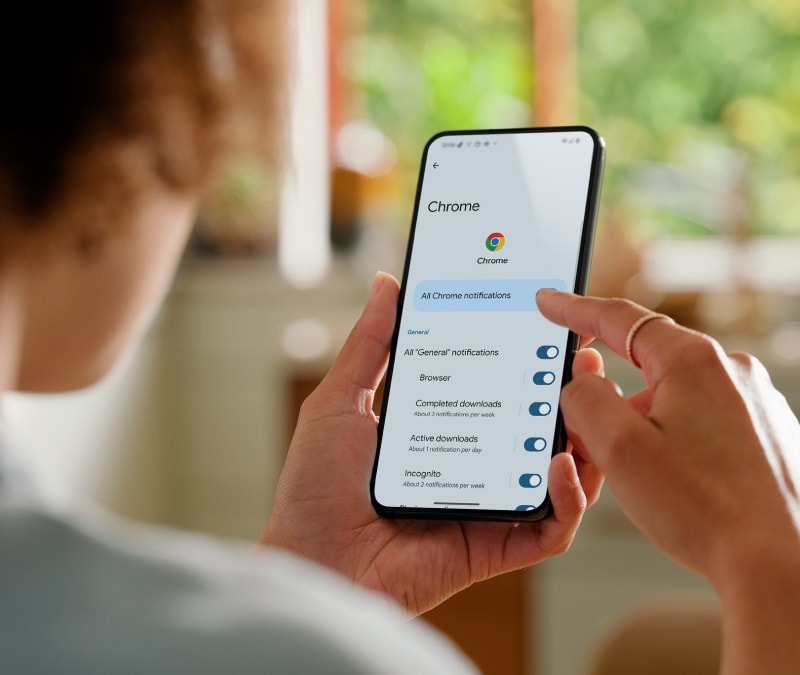





Want more?
Follow us for all the latest news, tips, and updates.